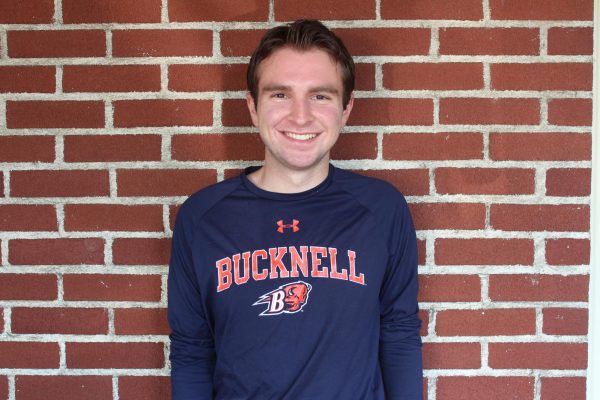George Will, one of the country’s most widely read political columnists and conservative voices, kicked off the Bucknell Forum 2023-24 speaker series, presenting on the theme “Freedom of Expression” on Tuesday, Sept. 19 at 7:30 p.m. in the Weis Center for the Performing Arts.
Introduced by Bucknell President John Bravman, Will began his speech with a story about his life and why he believed he chose a higher academic career as opposed to a career in baseball. He chastised universities and colleges around the country saying they used to be the “finest arts in civilization.”
“Their magnificent legacy, of which Bucknell is a part of, can be squared in a generation, destroyed from within, not from outside,” said Will. “They can fall in the control of people who are unsympathetic, even hostile to the university’s noble and timeless mission of free and fearless inquiry of dissertation.”
He then began to critique a common tone he believes festers around campuses in the modern world, specifically regarding the “large cohort of young people [students] who are not only fragile and easily frightened, but unashamedly so.” He cited the trauma-festering fragility within college campuses that can make these academic spaces places of alienation for people who disagree with a status quo or havens from verbal “harm.”
Will furthered his talk by speaking about the Doctrine of Natural Rights, and how Jefferson incorporated it into the United States’ founding documents and values—life, liberty and the pursuit of happiness. He spoke on the “sovereignty” of these rights within people and how the government’s job was to “secure” these rights given by God.
Will posited that these natural rights do not evolve as our country evolves, and he gave a speech given by former president Calvin Coolidge. He thought that any time government overreaches into our natural rights, such as censorship, a “politics of consciousness” is created, which Will said would be reinforced by an “existential crisis.”
Will analyzed many events, including one occurring today, to argue his point that “existential crises in this country are creating politics of consciousness and giving the government a go-ahead to limit freedom of expression.”
Will then discussed that the government is supposed to learn from history and that a conception of history would make people want their government to learn from it. He also touched on how the utilitarianism of democracy in this country has made everything political and every election “the most important election in history.” He cited philosophers and communist leaders to further his governmental and historical assertions.
Freedom of speech, according to Will, was necessary in a country that is governed by, for and of the people. Censorship would “harm” that, according to John Stuart Mill, whom Will cited.
“Mill’s harm principles create a never-ending domino event where everyone is harmed by something, and therefore, the problem today is not to free speech, it is from free speech,” said Will.
As evidence of this harm, Will cited the increasing number of “safe spaces” and DEI initiatives in colleges as well as governmental regulation of social media misinformation and disinformation. He said this is a slight of “totalitarianism and a relaxing of Jefferson’s prevailing natural rights.”
He ended the speech discussing his reasoning behind coming to Bucknell University to talk. For one, he loved Christy Mathewson, but he also believed this university could be an “imperative and wholesome example of freedom of speech.”
Will ended with a brief Q&A in which he discussed his thoughts on past political figures, campaign finance and political ideology within college campuses.
Will is the first of five nationally renowned speakers participating in this year’s Bucknell Forum—a speaker series that since 2007 has featured national leaders, scholars and commentators who have examined various issues from multidisciplinary and diverse viewpoints.






















